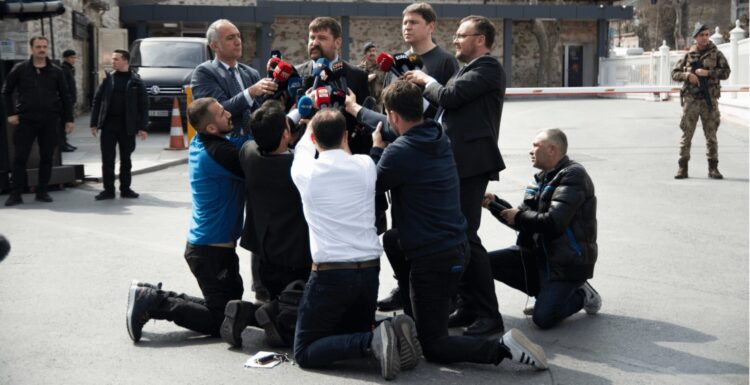Ending the war in Ukraine and establishing a lasting peace in Europe require a new security architecture.

Wars are not decided only by military deployments. There is a human factor, which always includes a future prospect, as evidenced in the unexpected resistance of Ukrainian citizens to the invasion of the Russian army. In addition to patriotism, an important, often decisive, political aspect concerns peace agreements and international co-operation, which can determine the future of whole epochs.
This happened at the outbreak of the second world war, when the British prime minister, Winston Churchill, and the United States president, Franklin D Roosevelt, met on August 14th 1941 in the Bay of Newfoundland to agree the Atlantic Charter, which identified fundamental principles for the reconstruction of world order once fascism was defeated. The Atlantic Charter made it possible to forge a solid alliance with the Soviet Union and the forces of the European resistance understood that they could contribute to the victory by fighting the enemy in the rear.
Russia’s military invasion of Ukraine is provoking a growing rivalry between opposing world powers, which could have catastrophic outcomes. The use of nuclear weapons is not excluded. In any case, if the war were to last for a long time, it would create a rift in Europe and in the world similar to that of the darkest years of the cold war. The acute confrontation between the US—through the North Atlantic Treaty Organization—and Russia would politically and militarily break the European continent into two opposing fronts.
New walls would arise at the borders in a continent which had seemed pacified. In 2012, the Nobel Peace Prize was awarded to the European Union with the declaration: ‘The EU has helped to transform most of Europe from a continent of war to a continent of peace.’ Across the entire world chessboard a new cold war between the US and Russia would have negative repercussions.
Decisive initiative
The EU must react to this dangerous drift. It was right to help the Ukrainian resistance with the available economic and military means. But the time has come for a decisive political initiative which offers a prospect of peace, not only to Ukraine and Russia but to the whole world.
China, India and many African states do not sympathise with the defence of ‘western values’: they have not forgotten that European countries used such language in the past to justify colonial enterprises. At the United Nations General Assembly on March 2nd, 141 countries voted to condemn the Russian invasion of Ukraine, 35 abstained and five (including Russia) voted against. The abstainers and opponents represent together the vast majority of the world’s population.
For an agreement to be reached on a renewed Atlantic Charter would certainly require time and laborious negotiations. Yet such a proposal, on the part of the EU, would show that a new cold war can be avoided and a path to lasting peace is viable.
Until now, the EU has made foreign policy in an unconventional way, through the progressive enlargement of the union. This enabled certain countries—the Czech Republic, Slovakia, Poland, Hungary, Romania, Bulgaria and the Baltic states—to join a supranational entity after the break-up of the Soviet bloc. Initially this diluted the EU’s political and social cohesion. But it avoided the unleashing of nationalistic hatreds as among the successor states of the former Yugoslavia, the bulk of which (outside Slovenia and Croatia) are still waiting to join.
International player
Now, for the first time since the collapse of Yugoslavia, the EU is facing a war on the continent. It lacks military means and does not yet have a shared direction of international politics. It is however an international political player, with its trade, currency and close international relationships.
Outside the EU, member states cannot make meaningful proposals to overcome the crisis opened up by the Russian aggression—although France under Emmanuel Macron’s continued presidency has gone on a solo run—whereas a new Atlantic Charter could launch a fruitful political and diplomatic debate about a multipolar system of great powers. There would be three subjects of the negotiations: the EU (coming to include Ukraine), the US and Russia.
The crucial objective of the negotiations should be ‘peaceful coexistence’ between great powers—a concept coined by the Soviet leader Nikita Khrushchev, to indicate the possible peaceful coexistence of capitalism and ‘communism’, but taken up by Andrei Sakharov and other dissidents. It was at the heart of the Helsinki Final Act of 1975, signed by almost all European and north-American states and the Soviets.
To achieve a significant result, the EU would have to overcome two obstacles. It must convince Russia that political boundaries can be progressively broken down by peaceful economic, political and military co-operation, as has happened between EU member states and as the countries of the African Union are doing, having decided to retain the borders arbitrarily drawn by the colonial powers to avoid unnecessary bloodshed.
As for the US, the EU must seek a renunciation of the policy, practised by the former president, Donald Trump, to assert commercial, financial and military supremacy in the world. As the former Israeli foreign minister Sholo Ben-Ami has argued, the US alliance system is formidable, yet Trump’s successor, Joseph Biden, is committed to strengthening it further—having sought to resuscitate NATO, created a new defence and technology alliance with the United Kingdom and Australia and deepened security co-operation among the ‘Quad’ (with Australia, India and Japan).
Permanently neutral
The proposal for a new Atlantic Charter might seem too long-term to influence peace negotiations between Russians and Ukrainians. Yet neither of the opposing military fronts has a serious prospect of forcing the adversary to an unconditional surrender. On the contrary, signs of fatigue and discouragement emerge in both camps.
Diplomacy calls for a resumption of the negotiations interrupted after the first talks in Istanbul in March. The political scientist Samuel Charap contends:
The Istanbul proposal … would establish Ukraine as a permanently neutral country and provides for international legal guarantees of its nonnuclear and nonaligned status … If this framework succeeds it could also provide a model for other nonaligned states, such as Moldova and Georgia, and ever for a new European security architecture, in which Russia and the West remain geopolitical adversaries but accept certain red lines.
A similar analysis is suggested by the economist Jeffrey Sachs: ‘It is still possible to establish peace in Ukraine based on the parameters that were on the table at the end of March: neutrality, security guarantees, a framework for addressing Crimea and Donbass, and Russia withdrawal.’
The proposal for a new Atlantic Charter could encourage the two sides to be less intransigent with their respective demands: what is the point of continuing a war, costing huge loss of life and resources, to establish borders which—under the new charter—would be considered an obstacle to be progressively eliminated? The EU and the AU base their prosperity and future on the removal of political, trade and military barriers.
Peaceful integration of the geopolitical space from Vancouver to Vladivostok is a prospect the Russian president, Vladimir Putin, has himself repeatedly proposed. Indeed, it seemed achievable when, in 1994, his predecessor, Boris Yeltsin, joined the Partnership for Peace proposed by NATO, in the belief that this was an alternative to its expansion to the east. Today it is possible and desirable to reactivate the Organisation for Security and Co-operation in Europe and the Council of Europe in the context of a new Atlantic Charter.
Reduction in tensions
Such a new charter would also have a positive impact on international relations in Asia. Peace among Russia, Ukraine, the US and the EU would show the way to a reduction in political tensions among China, Taiwan, Japan and others across the continent.
All UN member states should then be called upon to ensure compliance with this new peace pact in Europe. During the cold war, the UN played the crucial role of easing tensions between the superpowers. Today its role becomes even more important—and not only to ensure peace in the world.
The war in Ukraine is provoking a dramatic world food crisis, especially in the poorest countries. In addition, humanity faces the existential challenge of the ecological collapse of the biosphere. The mad race to increase military spending must thus be stopped: governments must devote more resources to the ecologically sustainable development of the planet until the launch of a global Green Deal.
War is not an inevitable fate. The painful experience of Ukraine should finally usher in radical reform of the UN, so that it is equipped with the institutional means to make the international rule of law prevail over the ‘right’ of military powers to wage war at their discretion—as Russia has done in Ukraine and as the US did in Iraq.
Guido Montani is professor of international political economy at the University of Pavia. He is a former president of the European Federalist Movement in Italy. He founded in 1987, in Ventotene, the Altiero Spinelli Institute for Federalist Studies. His latest book is Anthropocene and Cosmopolitan Citizenship: Europe and the New International Order (Routledge, 2024).

